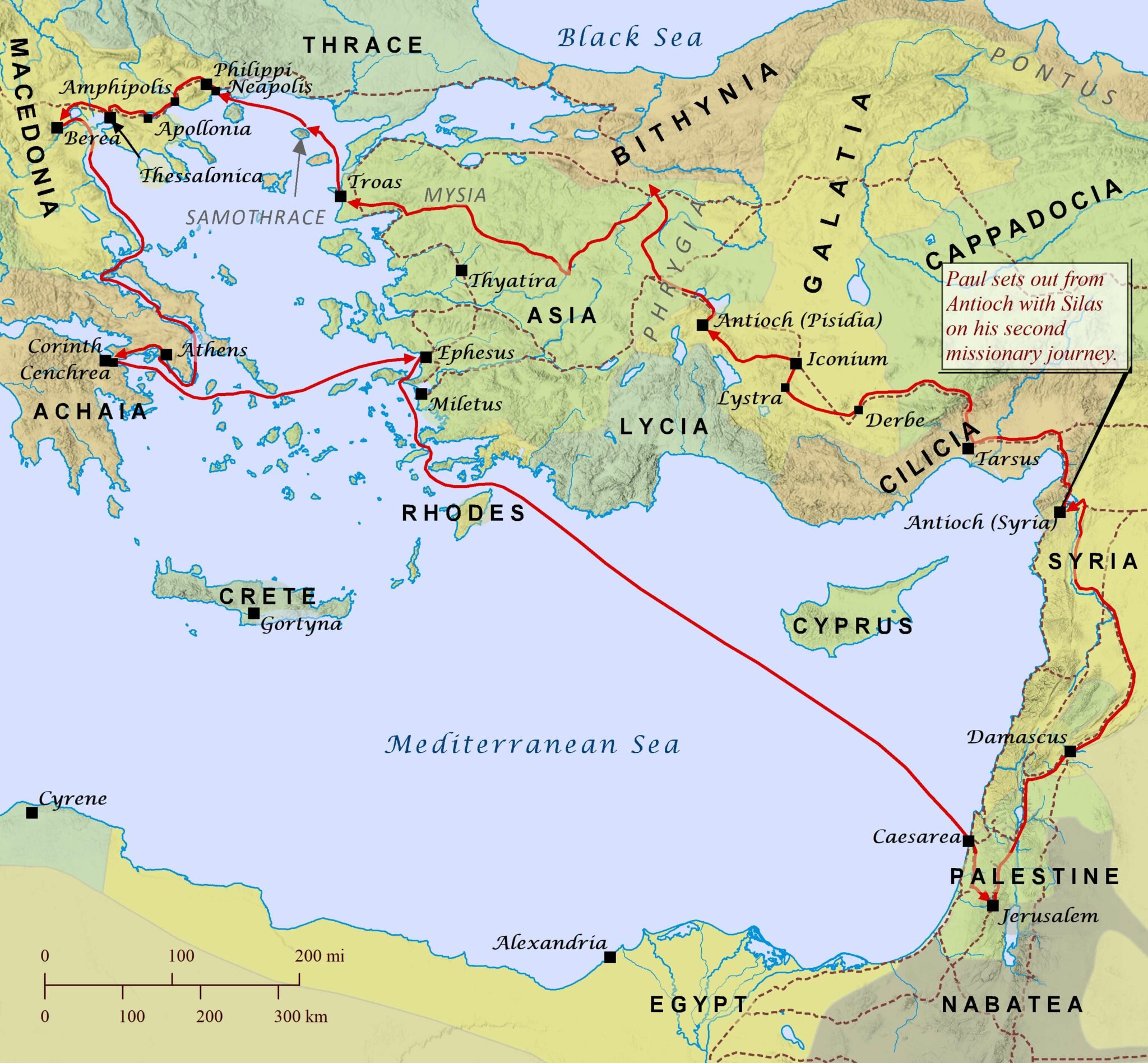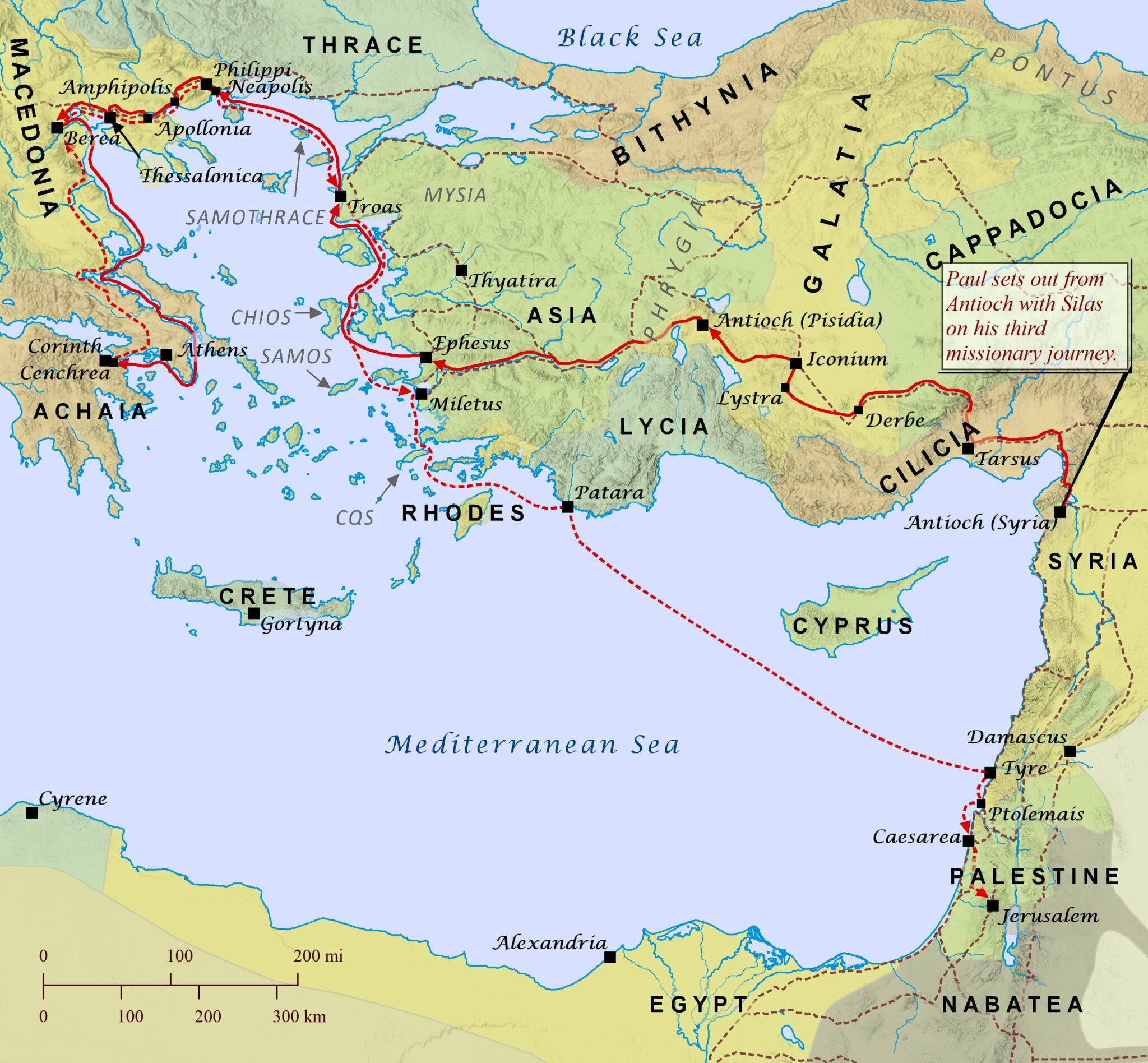Paul begins his personal request of Philemon. He asks him to forgive Onesimus, the slave that ran away from Philemon. Paul appeals to Philemon’s love. Using affectionate and familial terms Paul informs Philemon that Onesimus was born into Christ’s family and had become a believer when he met the apostle during his house arrest in Rome.
After commending Philemon for his love, faith, and service, Paul wrote that he has confidence in and authority from Christ to order him to do what is proper. Paul’s authority comes from being an apostle. An apostle is someone who was in the presence ofJesus and was appointed by Him. Paul was famously converted on the road to Damascus when he dramatically encountered the risen Lord (Acts 9:1-30). Paul was appointed by Jesus as an apostle to the Gentiles (Acts 9:15; 1 Timothy 2:7).
Remarkably, even though Paul had the authority in Christ to compel Philemon to do what is proper, he did not exercise it. Instead, he invited Philemon to choose what was proper of his own accord. Paul wrote for love’s sake I appeal to you to do what is good. Paul had already noted that Philemon was a man of love. Rather than command Philemon, Paul appeals to him that this would be an action consistent with his established pattern of ministry to others. This could be viewed as a “no good deed goes unpunished” kind of episode. The reward for loving is usually to be asked to love even more. But the perspective Paul seems to be taking is that this should be viewed as an additional opportunity to exercise good stewardship of our brief time on this earth, and win the prize of life through service to God. This is the perspective Paul had chosen for his own life, and was the perspective Paul advocated for all his disciples (1 Corinthians 9:24-29).
In this approach toward Philemon, Paul is following the example of Jesus. As God, Christ is perfect, good, and all-powerful. Nothing is impossible for Him to accomplish. Christ has the ability and authority to compel our obedience. But for love’s sake, He does not force us to do anything. For love’s sake God lets us decide who or what to trust, what perspective to take, and what actions to make.
For love’s sake Christ gives us the choice to follow His example of love or remain in our selfish ways. As Paul states in Galatians, Christ set us free; we have been granted stewardship to choose between following the Spirit or the flesh (Galatians 5:13-15). For love’s sake Christ lets us choose to obey or disobey Him. For love’s sake Christ lets us choose life or death; freedom or slavery. And for love’s sake our choices have consequences that greatly affect not only ourselves, but also the earthly lives of other people. Freedom—the ability to choose—is a necessary ingredient for love to be possible. Love must be chosen, it cannot be coerced.
Paul, like Jesus, is not denying Philemon the freedom and the opportunity to choose what is proper. He is not curtailing his opportunity to love Jesus, love Paul, and love Onesimus. Paul does however urge Philemon to make the best choice.
Before Paul even asked his request, he made it clear to Philemon that he was appealing to Philemon as a prisoner of Christ Jesus, not as Christ’s apostle. Again, like Jesus, who “existed in the form of God, did not regard equality with God a thing to be grasped, but emptied Himself, taking the form a bond servant” (Philippians 2:6-7), Paul does not regard his identity as an apostle here something to use for his own advantage, but takes the form and identity of a prisoner. Instead of coming to Philemon using his apostolic authority to order Philemon’s obedience, the apostle chose to appeal to him as such a person as Paul, the aged. Paul appealed to Philemon as his peer. And not only that, Paul assumes an inferior posture in his appeal to Philemon—because Paul was also a prisoner, while Philemon was a freeman. Further, Paul was the aged, likely referring to Paul’s frailties. Perhaps Philemon was younger and vibrant by contrast.
Paul’s appeal to Philemon was for my child Onesimus. As will become clearer in Philemon 1:15-16, Onesimus was Philemon’s runaway slave.
Slavery was deeply intertwined with the Roman economy. Some historians estimate that as much as one third of the empire’s population consisted of slaves. Rome’s stock of slaves was built up through its successful conquests and its captives in warfare and the offspring those captives produced. Slaves served in households, government work, labored in construction and road-building projects, worked in fields or mines, rowed ships, or fulfilled many other occupations. Slaves stemmed from all sorts of ethnicities. They had no legal standing in Roman society. Their masters could abuse or even kill them without any repercussion. But masters could also free them, and many did. The typical punishment for a slave running away from his master was death. Runaways were not uncommon. Life as a slave catcher could prove to be a lucrative career.
We can gain some insight into this through Paul’s interaction with a Roman soldier who was a commander who had purchased his citizenship with a substantial sum of money. He had arrested and chained Paul and was about to beat him when he discovered Paul was a natural-born Roman citizen. He then became fearful, since he had chained Paul against Roman law (Acts 22:22-29). This episode illustrates the stark contrast in legal standing between those who did and did not have citizenship.
During his flight as a runaway slave, Onesimus came into contact with Paul in Rome. Onesimus heard the gospel from Paul and received the gift of eternal life by the grace of Christ. The runaway slave forever became a part of God’s family. This is why Paul referred to Onesimus as my child, whom I have begotten in my imprisonment.
All of this, including Paul’s request likely came as a considerable surprise to Philemon. He must have shaken his head and asked, “How on earth could my runaway slave have befriended Paul in Rome? How could he have accepted Jesus and become an effective minister to the gospel while hiding from me? And how is it that Paul is now appealing on behalf of my troublesome slave?”
Paul’s appeal was conducted out of love for Philemon and Onesimus and it was rooted in the fact that Philemon and Onesimus were now eternally related to one another as brothers in Christ Jesus. Paul’s appeal for Onesimus had three requests for Philemon to consider.
The first request in Paul’s appeal was for Philemon to send Onesimus back to Paul where he could continue serving the Gospel, where he was useful to Paul in his imprisonment (Philemon 1:11-14).
The second request in Paul’s appeal was for Philemon to emancipate Onesimus from bondage as a slave. Paul was asking for Philemon to make Onesimus a freeman (Philemon 1:15-16).
The third request in Paul’s appeal was for Philemon to forgive any debt Onesimus owed him (Philemon 1:17-20).
Paul did not command any of these requests. He only asked or invited. Moreover, Paul never told Philemon that he should personally forgive Onesimus, now a brother in Christ, for any offense or wrongs he did against him. He instead let God bring this truth to Philemon’s heart.
Biblical Text
8 Therefore, though I have enough confidence in Christ to order you to do what is proper, 9 yet for love’s sake I rather appeal to you—since I am such a person as Paul, the aged, and now also a prisoner of Christ Jesus—10 I appeal to you for my child Onesimus, whom I have begotten in my imprisonment,
Check out our other commentaries:
-
Jonah 4:9-11 meaning
God asks Jonah if it is proper to be angry over a plant. Jonah affirms he has every reason to be angry, even to death....... -
Revelation 21:1-4 meaning
God promises that He will come and dwell among his sanctified people in the new earth where there will be no more pain....... -
Deuteronomy 33:13–17 meaning
Moses pronounces blessings on the tribe of Joseph (Ephraim and Manasseh)....... -
Matthew 14:34-36 meaning
Jesus and disciples arrive ashore and the word quickly spreads of His arrival. The people bring many who are sick to be healed by Jesus....... -
Exodus 11:4-8 meaning
Verses 4 – 8 contain the message that Moses gave to Pharaoh concerning this last plague.......




